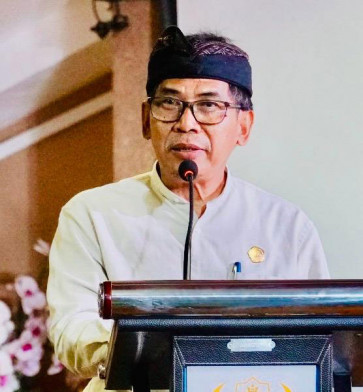Popular Reads
Top Results
Can't find what you're looking for?
View all search resultsPopular Reads
Top Results
Can't find what you're looking for?
View all search resultsParents’ oversharing on social media may put children at risk
A 27-year-old mother, Amalina, could not resist the temptation to share the overwhelmingly cute activities of her 1-year-old son, Rabbani, with her family members and friends
Change text size
Gift Premium Articles
to Anyone

A
27-year-old mother, Amalina, could not resist the temptation to share the overwhelmingly cute activities of her 1-year-old son, Rabbani, with her family members and friends.
She set up an Instagram account dedicated to her son, where she shared 180 photos and videos of her toddler to over 300 followers.
“People who care about parenting and want to engage with Rabbani’s content could, therefore, follow his account,” she said.
The Instagram account features Rabbani’s first attempts to crawl, walk and eat by himself. There is also this sweet moment of Rabbani going to the beach with his mother and father. Most of the posts have received dozens of likes.
At a glance, there seems nothing wrong with parents sharing their children’s news and pictures online, also known as “sharenting”. But experts have warned that the posts may put children under stress and compromise their online privacy.
Child psychologist Amanda Margia Agustario encouraged parents to think twice before posting their children’s photos on Facebook or Instagram.
“Parents should ask themselves beforehand: For whose sake am I sharing this moment? Is it really for my child’s benefit? Or is it only to feed my ego to show the world that I can raise such a smart and talented kid?”
Amanda said children whose activities were shared online were prone to anxiety. The children could become anxious or even depressed if they could not live up to the standard or online persona created by their parents, such as being talented and smart.
“Such a situation is not healthy for their mental development. Children need to feel accepted by their parents as they are,” said Amanda, who works at the Kasandra & Associates psychology consultation bureau.
She also mentioned the risk of the children being bullied online.
“Negative comments could damage the kids’ self-concept. It could also turn a previously positive self-concept into a negative one,” she explained.
Luthfinnisa, 25, has felt the bitterness of witnessing her 1-year-old son and herself being bullied in the comments section of an Instagram account dedicated to her son.
“Someone accused me of not taking care of my son because he was tiny. It’s kind of annoying,” said Luthfinnisa, who left her career to take care of her family.
She has deactivated her son’s Instagram account and is considering only sharing her son’s pictures with close relatives.
“I might post his activities on my Instagram account in the future. But I’ll make sure that only my close friends are allowed to see it.”
Facebook and Instagram require everyone to be at least 13 years old before they can create an account. But in Indonesia, it is a trend among parents — including celebrities and influencers — to create their offspring's Instagram accounts only days after the children are born.
Parents see it as a way to keep all the parenting milestones and memories, which hopefully the children will cherish and reminisce as they grow up. But will the children really appreciate this?
British data analytics firm YouGov surveyed 863 children aged between 8 and 15 in August and found that 44 percent of the children wanted to be able to approve the photos their parents chose to post, while the other 7 percent wanted to ban their parents from posting any at all.
Forty-six percent felt fine about their parents sharing their photos without asking for permission first, while the other 3 percent said “I don’t know”.
Among those who either wanted to approve their parents’ photos of them or ban them entirely, the primary reason was embarrassment. Six in 10 found the photos their parents post of them to be humiliating. Some of the respondents also said they were concerned about their privacy, who would see their pictures online, and the risk of being ridiculed by other children because of the photos.
More than posing a risk to children’s confidence, sharenting can also expose them to identity-theft and predators.
A study by Australia’s new Children’s eSafety Commissioner, as reported by The Sydney Morning Herald in 2015, revealed that innocent photos of children initially posted on social media accounted for up to half the material found on pedophile sites.
From those pedophile sites, investigators recovered tens of millions of photos of children doing everyday activities — which were originally posted on popular sites such as Facebook and Instagram.
In Indonesia, the Indonesian Child Protection Commission (KPAI) has recorded increasing number of pornography and cybercrime with children as victims since 2014. From bullying to pornography, the total number of the reported cases reached 679 last year.
“The parents unintentionally put their children in danger by largely sharing the kids’ photos online,” said Alfons Tanujaya, a cybersecurity expert from computer security firm Vaksinkom.
Alfons underlined the risk of identity thief, where scammers steal and misuse children’s photos they find on social media.
Big data technology has made it possible to process a collection of someone’s photos from various angles into a facial-recognition database, which can be used by scammers to infiltrate secured systems.









